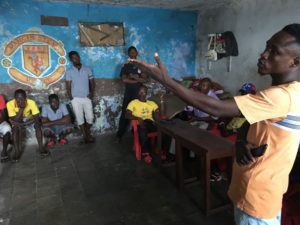Blog
Who is Research For? Feeding Back Research Findings in Sierra Leone
Written by Luisa Enria
August 7, 2018
Grappling with Impact in Development Research
Who and what is research for? This is not a new question for development scholars, but it has gained salience in British universities in recent years. “Impact”, or research’s ability to “change or benefit the economy, society, culture, public policy or services, health, the environment or quality of life”, is an increasingly important assessment criterion for research excellence.
There are, however, important reasons to be sceptical of definitions and measurements of research impact. Critics have rightfully pointed out how the “impact agenda” skews research incentives. They also complain that this devalues certain types of research compared to others. Proving impact often requires showing that policy makers take our findings on board. This raises questions about academics’ ability to be highly critical of the very organisations and processes they are supposed to influence.
Collaborations between scholars from the global North and those from the global South are also important in this agenda. Yet these rarely translate in practice into effective partnerships and often undermine scholarship in developing countries.
A renewed focus on impactful research has not necessarily taken us close to the pursuit of social justice, not least as it occurs in the midst of challenging times for universities.
Power in the Field
Many people have asked me who and what research is for in the communities where I have done research in Sierra Leone. These questions are more important to me. They remind me that participants frequently expect that my presence in their communities will result in tangible changes in their lives. (Of course, this is a much taller order than a citation in a policy paper).
They also remind me of the injustice that is often part and parcel of the research process, which I embody as a Western researcher. At the same time, they prompt important considerations about why I ask people to let me into their lives, especially when those lives are difficult as they often are in Sierra Leone. These concerns were at the forefront of my mind as I prepared to organise research dissemination events earlier this year.
Feeding Back Findings in Sierra Leone
Entitled States of Emergency: Citizenship in Crisis in Sierra Leone, the project explored how young Sierra Leoneans understood and experienced citizenship in a country that has undergone two major crises, a civil war and a devastating Ebola outbreak of Ebola. I did the research in Magazine Wharf (an informal settlement in Freetown) and Kambia district (in the Northern Province of the country).
The final phase entailed organising feedback workshops as part of an impact strategy. I was nervous that the workshops would turn into box-ticking exercises. What’s more, I was concerned that they would not be meaningful to the young people of Kambia and Magazine. However, organising the workshops and debriefing after with invitees taught me some important lessons.
I decided that my primary audience would be the young men and women I had interviewed and spent time with during five months of ethnographic fieldwork. Alongside representatives of these communities, I also invited policy-makers and civil society activists. In my invitation and introduction, I framed the workshops as an opportunity to explain what I had done and planned to do with the findings. I also presented some of the highlights for them to discuss.
I organised the workshops in the communities where the research took place. They were well attended and stimulated lively discussion. In a workshop in Freetown, young people from Magazine Wharf exchanged phone numbers with a newly appointed Minister. They promised to fill her in about their dissatisfaction with the services available in their neighbourhood. I also asked invitees to make recommendations that I later relayed in meetings with aid organisations in country and in the UK.
Back to Basics
Making sure research is not purely extractive is a key ethical principle, but one that we rarely put into practice. I was worried about the workshops because I thought they would not be enough. But in my concern to work out my research’s tangible outcomes, I risked forgetting the basic ethical requirement of telling people what I had done with the data I had collected in their communities.
The workshops did not change anyone’s life. They are also unlikely to have a measurable impact on policy or programming in the communities where I worked. They didn’t give me any illusion that I’d addressed concerns about power and injustice in the research process and my role in the lives of young people in Kambia and Magazine.
However, they were meaningful in a different way. It gave me an opportunity to thank my young interlocutors for their time. I was also able to show them that I had really listened to them, and that I was interested in their opinions about my findings. As invitees expressed their excitement about hearing their stories, they reminded me of the less instrumental ways in which research gives people agency to tell their own stories. The next step is to figure out how those voices, rather than ours, can contribute to processes of change.
Luisa Enria is Lecturer in International Development at the University of Bath. She is author of The Politics of Work in a Post-Conflict State: Youth, Labour and Violence in Sierra Leone. She tweets at @luisaenria

